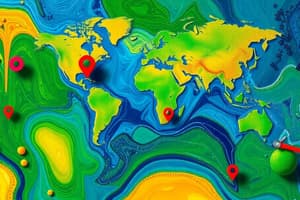Podcast
Questions and Answers
Which branch of geography focuses on human activities and cultures?
Which branch of geography focuses on human activities and cultures?
- Human Geography (correct)
- Geospatial Technology
- Physical Geography
- Environmental Geography
What does the concept of 'place' in geography refer to?
What does the concept of 'place' in geography refer to?
- The movement of people and goods
- The economic activities of an area
- The physical and human characteristics defining a location (correct)
- The precise coordinates of a location
How is 'absolute location' defined in geography?
How is 'absolute location' defined in geography?
- Cultural influences on a region
- Precise coordinates like latitude and longitude (correct)
- General characteristics of an area
- Position relative to other places
Which of the following methods is primarily used for spatial analysis?
Which of the following methods is primarily used for spatial analysis?
What type of region is defined by shared perceptions and characteristics?
What type of region is defined by shared perceptions and characteristics?
What is the primary focus of sustainability in geography?
What is the primary focus of sustainability in geography?
Which tool is commonly used to create visual representations of spatial information?
Which tool is commonly used to create visual representations of spatial information?
Which theme in geography involves analyzing how humans adapt to their environment?
Which theme in geography involves analyzing how humans adapt to their environment?
Flashcards are hidden until you start studying
Study Notes
Key Concepts in Geography
Definition
- Geography is the study of the Earth's landscapes, environments, and the relationships between people and their environments.
Branches of Geography
-
Physical Geography
- Examines the natural environment: landforms, climate, ecosystems, and biogeography.
-
Human Geography
- Studies human activities, cultures, economies, and interactions with the environment.
-
Geospatial Technology
- Involves tools such as GIS (Geographic Information Systems), remote sensing, and GPS for spatial analysis.
Major Themes in Geography
-
Location
- Absolute location: precise coordinates (latitude and longitude).
- Relative location: position in relation to other places.
-
Place
- Physical characteristics (landforms, climate) and human characteristics (culture, economy) that define a location.
-
Region
- Areas defined by common features: formal regions (political, physical), functional regions (interconnected areas), and vernacular regions (perceptions).
-
Human-Environment Interaction
- Examines how humans adapt to and modify their environment.
-
Movement
- Studies how people, goods, and ideas move across space; includes concepts of migration and diffusion.
Tools and Methods
-
Maps
- Represent spatial information; types include thematic, topographic, and political maps.
-
Remote Sensing
- Collects data from satellites or aircraft to analyze earth's surface.
-
GIS
- Analyzes spatial data and helps in decision-making processes.
Important Concepts
-
Scale
- The relationship between distance on a map and the actual distance on the ground.
-
Cultural Landscape
- The alteration of the natural landscape by human activity, reflecting cultural values.
-
Sustainability
- The balance between meeting human needs and preserving the environment for future generations.
Global Issues Related to Geography
- Climate change and its impact on environments and societies.
- Urbanization and the implications for infrastructure and resource management.
- Environmental degradation and conservation efforts.
Definition of Geography
- Geography is the study of the Earth, its landscapes, environments, and the relationship between people and their surroundings.
Branches of Geography
- Physical Geography focuses on the natural world, including landforms, climate, ecosystems, and the distribution of life on Earth.
- Human Geography examines human activities, cultures, economies, and how people shape and interact with their environments.
- Geospatial Technology utilizes tools like GIS, remote sensing, and GPS to analyze spatial data and understand geographic patterns.
Major Themes in Geography
- Location defines a place's position:
- Absolute location uses precise coordinates (latitude and longitude).
- Relative location describes a place's position in relation to other places.
- Place encompasses a location's unique physical and human characteristics:
- Physical characteristics include landforms, climate, and vegetation.
- Human characteristics include culture, economy, and population density.
- Region groups areas based on shared features:
- Formal regions are defined by political boundaries or physical characteristics.
- Functional regions are connected by a shared function or purpose.
- Vernacular regions are defined by people's perceptions and shared understandings.
- Human-Environment Interaction examines how people adapt to and modify their environments.
- Movement analyzes the flow of people, goods, and ideas across space.
- This includes concepts like migration and the spread of innovations.
Tools and Methods in Geography
- Maps visually represent spatial information, showing features like physical landscapes, political boundaries, and thematic distributions.
- Remote Sensing uses satellites or aircraft to collect data about Earth's surface, providing insights into land cover, vegetation, and urban development.
- Geographic Information Systems (GIS) analyzes spatial data, allowing geographers to create maps, model spatial relationships, and make informed decisions based on geographic information.
Key Concepts
- Scale refers to the relationship between distances on a map and real-world distances.
- Cultural Landscape represents the visible imprint of human activities on the natural landscape, reflecting cultural values and practices.
- Sustainability promotes a balance between meeting human needs and preserving the environment for future generations, ensuring long-term environmental and social well-being.
Global Issues Related to Geography
- Climate Change impacts environments and societies worldwide, leading to changes in weather patterns, rising sea levels, and extreme weather events.
- Urbanization involves increasing populations living in cities, creating challenges for infrastructure, resource management, and social services.
- Environmental Degradation includes issues like pollution, deforestation, and biodiversity loss, requiring conservation efforts and sustainable practices to protect ecosystems and natural resources.
Studying That Suits You
Use AI to generate personalized quizzes and flashcards to suit your learning preferences.




